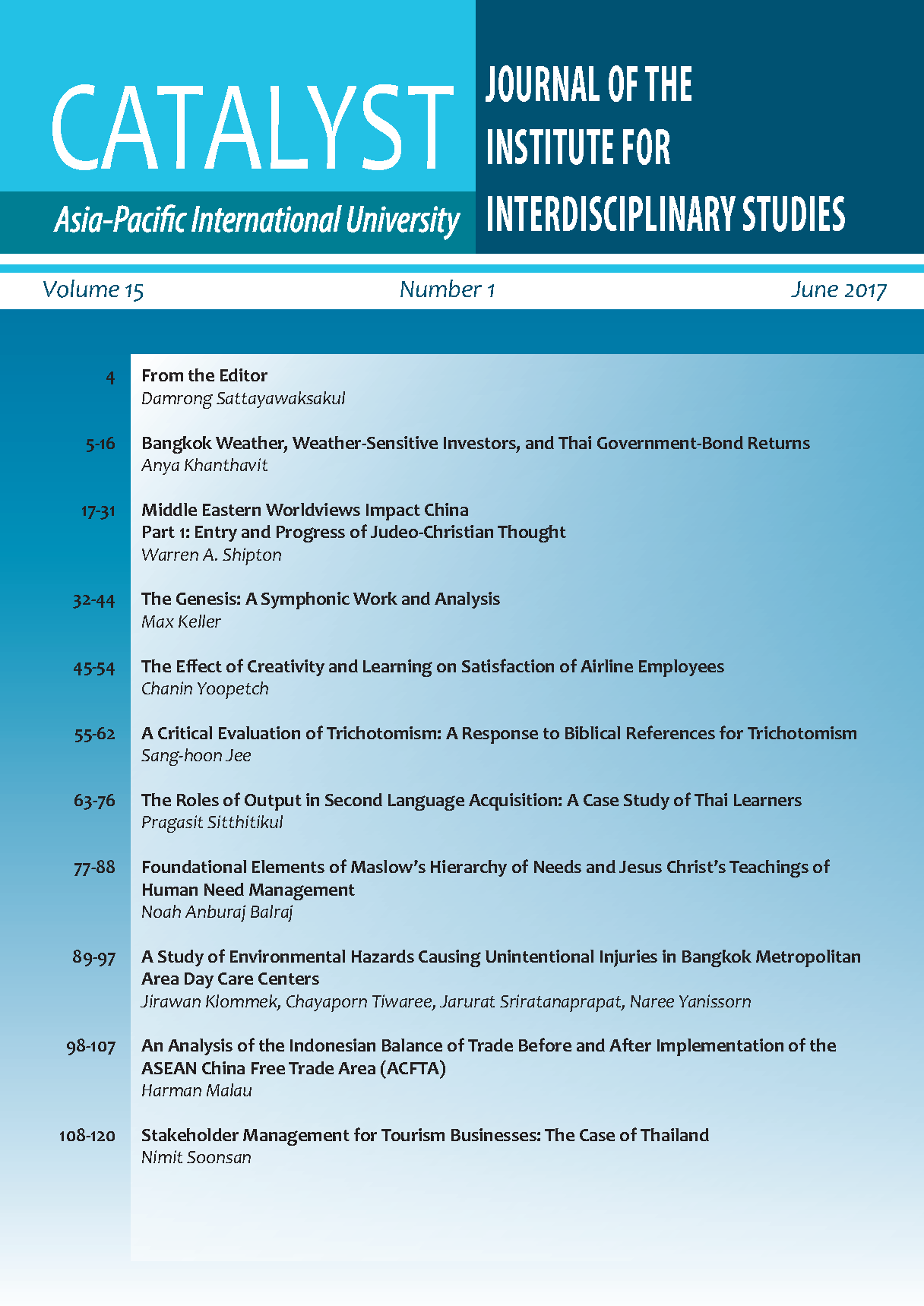Foundational Elements of Maslow’s Hierarchy of Needs and Jesus Christ’s Teachings of Human Need Management
Main Article Content
Abstract
Human need is an important phenomenon. It is widely studied and analyzed in daily life. This study was about human need and its reality in the perspectives of Abraham Maslow and Jesus Christ. The paper predominately analyzes Maslow’s hierarchy of need and Jesus Christ’s teachings of human need management. The paper identified the foundational elements of both these models of human need management. The findings point out the foundational element of Maslow’s hierarchy of needs as being self-oriented for it is natural (without God) man’s thinking. On the other hand, Jesus Christ’s teachings of human need management stand on ‘Life” as the foundational element, and seeking first the kingdom of God and his righteousness would provide all other needs. Establishment of spiritual (Life) in a human being is a sure establishment of physical. The similarity of Maslow’s and Jesus Christ’s teachings both identify the foundational element, self, which seeks to manage human need based on physiological need. Jesus points out the human conception of “self” being the foundation for need management is a misconception (Human fallen nature’s propensity). Jesus Christ’s teachings point out that Life is the real foundation/way/truth for human need management/fulfillment.
Article Details

This work is licensed under a Creative Commons Attribution-NonCommercial-NoDerivatives 4.0 International License.
Copyright: Asia-Pacific International University reserve exclusive rights to publish, reproduce and distribute the manuscript and all contents therein.
References
Brooks, W (1974). Effects of Cultural Differences on Motivation. The Personnel Administrator, 19(7), 28. Retrieved fromhttp://search.proquest.com/docview/205050685/C2427B0EC287484FPQ/4? accountid=39909.
Cao, H.; Jiang, J.; Oh, L.; Li, H.; & Liao, X. (2013). A Maslow’s hierarchy of needs analysis of social networking services continuance. Journal of Service Management, 24(2), 170-190. Retrieved fromhttp://search.proquest.com/docview/1355511203/A91B299AA43F4303PQ/56? accountid=39909.
Gambrel, P., & Cianci, R. (2003). Maslow’s Hierarchy of Needs: Does It Apply in a Collectivist’s Culture. Journal of Applied Management and Entrepreneurship, 8(2), 143-161. Retrieved from http://search.proquest.com /docview/203916225/C2427B0EC287484FPQ/15?accountid=39909.
Hagerty, M. (1999). Testing Maslow’s hierarchy of needs: National quality-of-life across time. Social Indicators Research, 46(3), 249-271. Retrieved from http://search.proquest.com/docview/ 197606335/A91B299AA43F4303PQ/46?accountid=39909.
Idiosynoratic [Definition.1]. (2016). In Dictionary.Com. Retrieved from http://www.dictionary.com/ browse/idiosyncratic?s.
Instinctoid. (2016).In Alleydog.Com. Retrieved from https://www.alleydog.com/search-results. php?q =instinctoid&x=0&y=0
Kotler P. & Keller K. (2016). Marketing Management (15th edition). Pearson.
Maslow, A. (1954). Motivation and Personality. Harper & Row, Publishers Inc.
McLeod, S. (2007). Maslow’s Hierarchy of Needs. Simply Psychology. Retrieved from http://www. simplypsychology.org/maslow.html.
Nain, B. (2013). Porous Hierarchy of Needs: An alternative to Maslow’s Hierarchy of Needs. Indian Journal of Positive Psychology, 4(3) 464-467. Retrieved from http://search.proquest.com/ docview/1613959955/F191A88FB2E04FCBPQ/1?accountid=39909.
Rouse, K. (2004). Beyond Maslow's Hierarchy of Needs: What Do People Strive For? Performance Improvement, 43(10), 27-31.
Rafiq, E. (2016). 6 Steps for Effective Critical Thinking – Designorate. Retrieved from http://www. designorate.com/steps-effective-critical-thinking.
Vikas, S. (2012). The Role of Fashion in Human Culture. Retrieved from https://thoughteconomics. com/the-role-of-fashion-in-human-culture.
Wang, Y. (2010). Considering the human needs from the view of the historical materials. Hauzhong Normal University (People’s Republic of China), ProQuest Dissertations Publishing, 10438491. Retrieved from http://search.proquest.com/docview/1868451885/AF600E7B04048F7PQ/1? accounted=39909.
White, E. G. (1896). Thoughts from the Mount of Blessing. Pacific Press Publishing Association.
White, E. G. (1897). Duty to Know Ourselves. Healthful Living, p. 76.
Wirtz, J., Chew, P., & Lovelock, C. (2012). Essentials of Services Marketing (2nd edition). Pearson.


